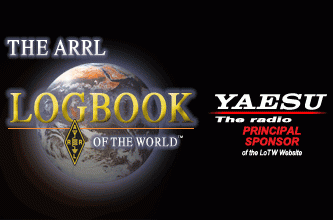Trusted QSL V2.5.6 Released
TQSL is free software used to upload and sign logs to the ARRL Logbook of the World (LoTW). TQSL works with Windows, MacOS and Linux. LoTW is free to all Amateur Radio Operators around the world, and membership in the ARRL is not required to use LoTW.
The latest version of TQSL can be downloaded from the ARRL website.
Trusted QSL V2.5.6 Release Notes
This version of Trusted QSL ({TQSL) has new features as well as corrections for defects found since TQSL
2.5.5 was released. This release also includes an update to the most recent TQSL configuration file.
Three serious defects in TQSL were corrected in this release. One was a incompatible change in
command-line log handling, one could cause the ADIF editor to lose files being edited, and a third was a
potential crash in TQSL.
TQSL 2.5.6 can be installed to upgrade any older version of TQSL.
For the Mac platform, TQSL now uses a package file (.pkg) for installing TQSL. This is hopefully easier to
use as it is a familiar way to install software for most Mac users.
On all three supported platforms (Windows, MacOS, and Linux), installing TQSL 2.5.6 will replace older
versions of Trusted QSL while preserving your Callsign Certificates, Station Locations, and preferences.
On Windows, simply run the TQSL 2.5.6 installer, which will automatically uninstall older versions of
TQSL (and, if installed, TQSLCert). On Mac OS X, open the package (.pkg) file to install TQSL into your
Applications folder. (Note that the “tqsl-legacy” package is for legacy Mac systems — 32 bit Intel and
PowerPC.) Direct the installer to “Replace All”, which will uninstall old files. For Linux systems, unpack
the tar file and read the INSTALL file for directions.
TQSL 2.5.6 has been “localized” to allow use in the native language of non-English speakers. This could
not have been done without the help of the volunteers who have contributed translations for TQSL.
Thanks to the following for their assistance:
Catalan: Xavier, EASW
Chinese: Caros, BH4TXN
Finnish: Juhani, OHBMXL
French: Laurent BEUGNET, F6GOX
Hindi: Manmohan, VU3YBH
German: Andreas, DF4WC
Italian: Salvatore, WV4FYV
Japanese: Akihiro, JLZOXR
Portuguese: Nuno, CT2IRY
Russian: Vic, USS5WE
Spanish: Jordi, EASGCV
Swedish: Roger, SMOLTV
Turkish: Ojuzhan, TA2ZNC.
The following list describes the major changes in the v2.5.6 release of Trusted QSL.
TQSL changes
Defects Corrected:
When passing an empty password on the command line (for example, -p “” to indicate an empty string),
TQSL could skip the empty string and assume the following command line option was the password. For
some programs, that was the name of the file to sign, meaning that no log was signed. This behavior
changed from prior TQSL versions due to an update in the underlying library that handles the GUI for
tqsl. TQSL now ignores an empty password.
When the ADIF editor is being used to create or edit an ADIF file, closing the window did not prompt to
save the file, which was discarded. TQSL now prompts the user to determine if the file should be saved.
When signing a log in “update station location” mode, TQSL could crash if the log changed the DXCC
entity such that the original CQ/ITU zones were no longer valid. TQSL now changes those to “none”
when the entity changes.
Major feature Additions:
When signing a log with errors, TQSL would report the line number of the “<eor>” at the end of the ADIF
record. TQSL now (in most cases) reports the actual line number in the file with the error.
Minor Updates:
To avoid the confusion between multiple uses of the word “Password” to refer to different objects in
TQSL, the string used to protect a callsign certificate is now referred to as a “Passphrase”. Note that
passphrase protection of Callsign Certificates is disabled by default.
A Swedish localization was provided by Roger, SMOLTV.
Added the ability to automatically install a TQSL update on the Mac platform. This will allow easier
update when the next version of TQSL is released.
Reinstalling TQSL 2.5.5
Downgrading to TQSL 2.5.5 can be seamlessly performed by uninstalling TQSL 2.5.6 and reinstalling TQSL
2.5.5.

